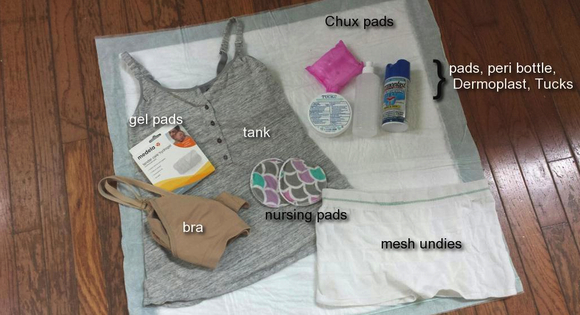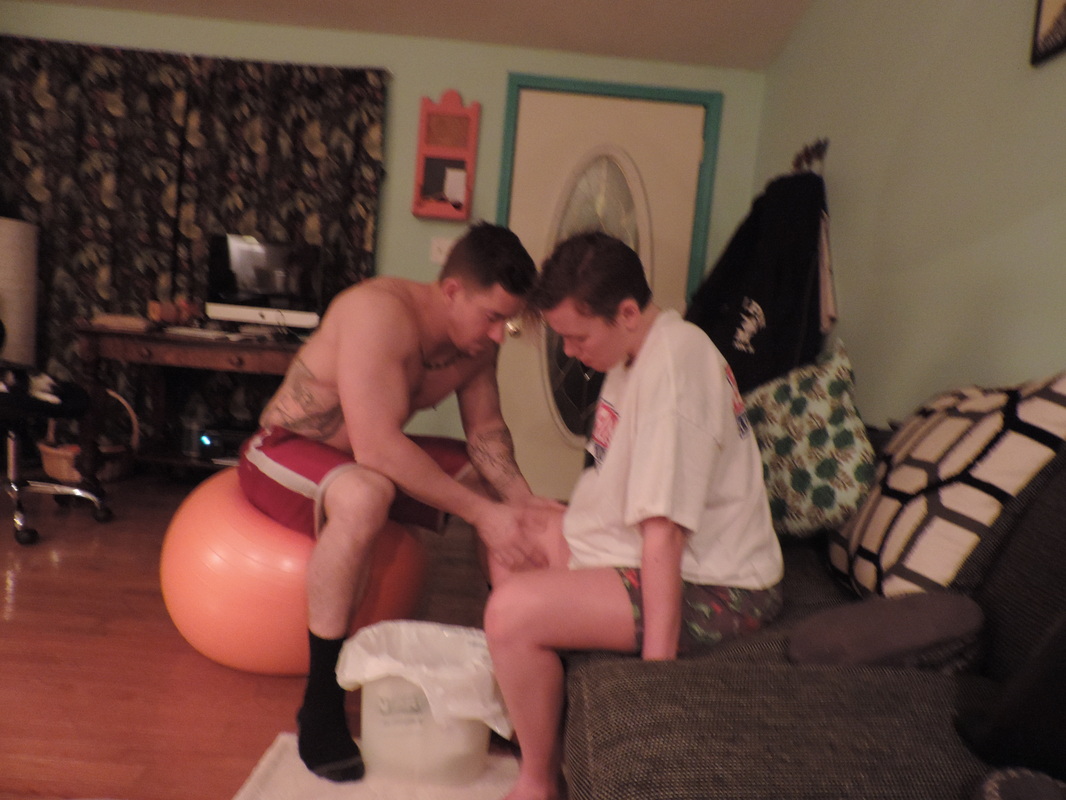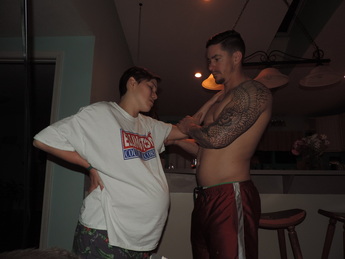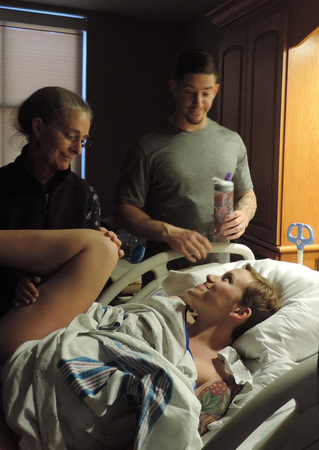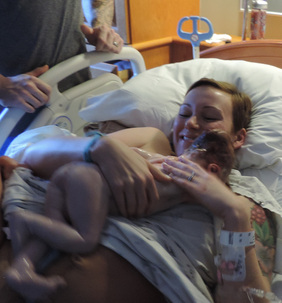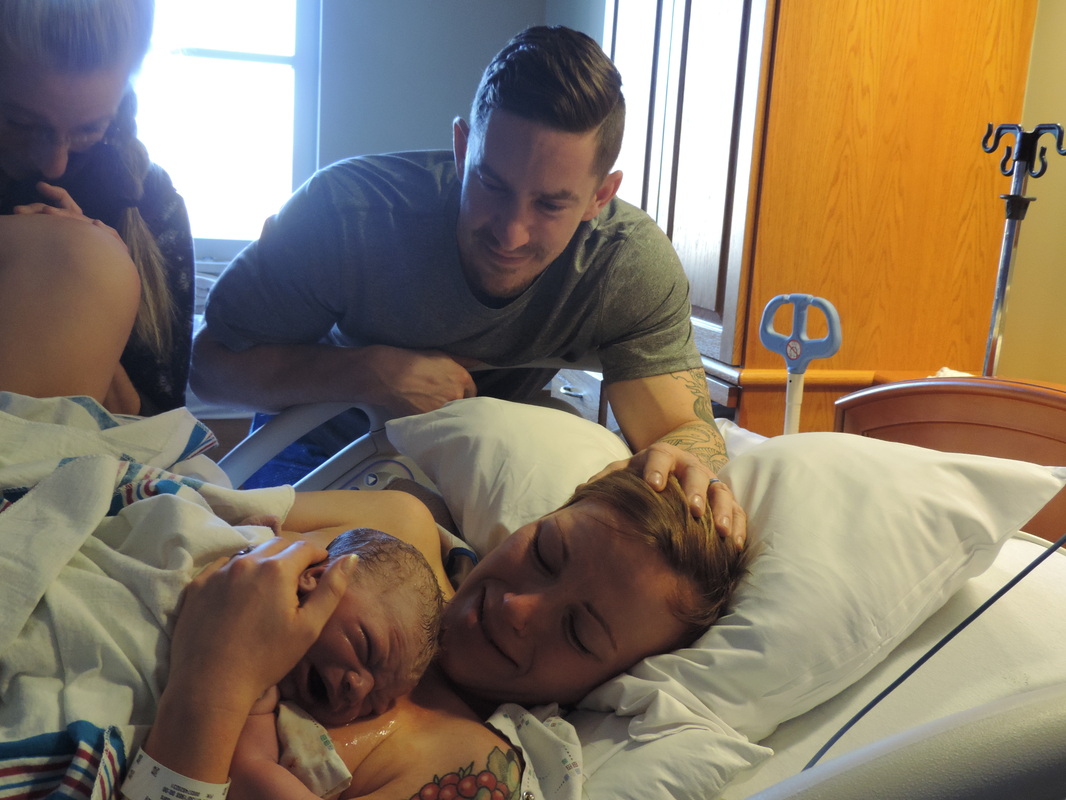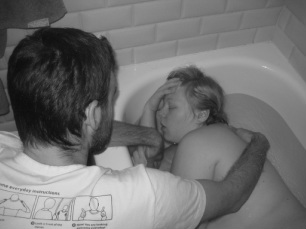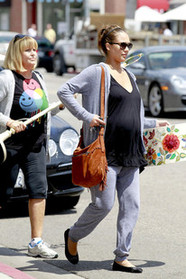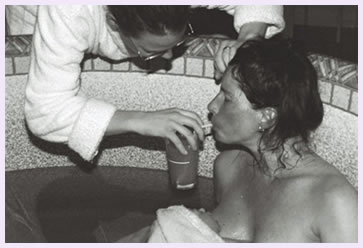These are just a few things that I couldn't live without in those first weeks of the postpartum period:
What items were essential in your early days as a new mama?
1 Comment
The days before our baby B arrived, I woke up every morning thinking to myself, "Maybe today is the day!" and I would climb into bed every night thinking, "Well, maybe tomorrow." I knew my baby would come when he/she was ready (we didn't know the babe's gender) so I tried to distract myself as much as possible while waiting. I cleaned the house, organized the nursery, went to the gym, watched every episode of New Girl on Netflix, soaked in the bath while reading Ina May, bounced on my birth ball, drank lots of red raspberry leaf tea, baked the baby a birthday cake (lemon bundt cake to be specific--thank you, Pinterest!). I tried remaining positive, knowing this was a special time between my husband, J, and I. It would only be just the two of us for a little while longer, and soon we would be a family of three. It was a surreal concept that I couldn't quite wrap my head around, and despite it being unknown territory I was very excited. We planned to birth our babe at home with the help of a certified professional midwife. We also hired an amazing doula, who is also a close friend, to assist us at the birth. We rented a birth pool and did a couple of test runs to make sure we knew how to use it. I made birth affirmations and placed them on the wall behind the pool, knowing that these positive mantras would help carry me through labor. I made a playlist and day dreamed of bringing my baby earth side while the sweet and slow music played in the background. Our home birth supplies were neatly stacked in the co-sleeper that sat in our bedroom. I thought, "Any day now, baby. We're ready for you!" Day 1- On the morning of January 16 around 1am, I woke up to mild contractions. At the time, I wasn't calling them contractions as I didn't really know what 'contractions' felt like. Basically, I was really crampy. I would get up about every hour until 8am or so to pee and work through the crampiness. The cramps were mild enough that I was able to doze off once I climbed into bed. I continued on throughout the day with all of the activities that kept me busy throughout the week before (exercising, baking, Netflix binging, etc.) My contractions were spaced out but present throughout the day and into the evening. I had lost part of my mucus plug the day before so I knew something was happening. 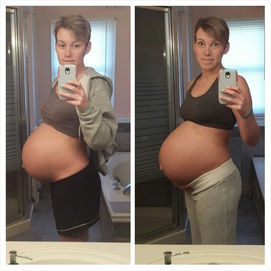 Belly getting lower and lower... Belly getting lower and lower... Day 2- Did the same damn things I did on Friday. Woke up frequently throughout the night due to crampiness and having to pee often. Cleaned the house and ran some errands. In the afternoon, J and I went to Gandolfo's for lunch. The seats were incredibly uncomfortable and hard. I was having consistent contractions and I'm sure people were starting to stare (No one else was deep breathing during their lunch!) J said I pulled it off like a champ, but I didn't believe him. We went downtown and walked up and down Kirkwood and stopped by Hartzell's for ice cream. Still very crampy, I thought to myself, "YES! It's happening. This baby is coming." By the way, there are a lot of cool celebrities born on January 17 so, naturally, I had an inkling today would be the day. Day 3- I'm still pregnant. I, again, woke up right around 1am on Sunday morning with those annoying contractions. I knew these contractions were helping my body prepare for baby but I was so over it. Up every hour but this time, it only felt good to sit on the toilet. I didn't want to move! I tried to stay in bed until 8am or so but I don't think I got much sleep. Is this cramping helping my cervix move forward? Helping it to thin and shorten? Am I dilating? My childbirth educator/doula brain would take over and I couldn't turn it off. I reminded myself that even if I couldn't sleep, it was important to rest as much as possible. I was hoping I was in early labor but didn't want to get my hopes up. J came home from training clients at the gym and brought me Cresent donuts for breakfast (yep, my husband/ personal trainer brought me donuts. That's love.) I continued to cramp throughout the morning, and later on, we decided to go back to Gandolfo's for lunch (the food there is good but you know, we had coupons to use up). Those seats!! They were so hard and uncomfortable. I had only taken a few bites out of my sandwich before realizing I no longer wanted to be at Gandolfo's. J offered to wrap up my sandwich while I went to the bathroom. I was having contractions every 2-3 minutes and they were lasting around 40 seconds each. I was also losing more of my mucus plug. Of course, I was all like, "Is this early labor? Active labor?!" I continuously had to remind myself to get out of my head and focus on the now. We drove over to the east side of town and walked around the mall for an hour or so. My contractions were still very close together, so we left the mall and went to Kroger to get some last-minute groceries. I felt so uncomfortable that I didn't want to go in and decided to sit in the car. Soon after my husband got out of the car I realized I could not sit still. I got out and leaned on the car, swayed my hips, and was squatting in the parking lot. Keep in mind this is the new, swanky Kroger that's always hoppin'. The waiting felt like forever and I was extremely eager to get home. I started to vocalize through my contractions and texted our doula once we pulled in the driveway. She recommended we both sleep as we would probably be up most of the night. Shortly after climbing into bed for a nap, my husband was out. Me, on the other hand...I couldn't get comfortable one bit. I was having a hard time coping but didn't want to wake him up so I ventured off to the opposite end of the house. I desperately wanted to get in our bath tub but knew that water would not help speed up labor until I was in the thick of it. Being immersed in warm water in early labor can slow down or stop your contractions. I decided it was more important that I try to catch up on rest than focus on making contractions more progressive. Our doula arranged to be over by 7pm. I was very emotional and cried to J when he woke up. He calmed me down, reminded me that I was doing a great job, and that our doula would be there soon. When our doula arrived, I was in our dimly lit bedroom moaning and swaying. She encouraged me to do some lunges and offered me sips of water. I moved to the toilet where she propped me up with pillows and rubbed my back. It was starting to hurt but in an unusual way-- like it was pulling from underneath my ribs. I soon realized I had pulled a muscle and thought it may have happened while in the tub. Soon after, I began throwing up. I thought, "Yes. Bring it on! I'm sure this puking is helping me open up." Our doula contacted the midwife and updated her on what was happening--she said she would be over soon.
It was around 1 or 2am when my midwife suggested I whip out my hand pump. My contractions were still very strong but had spaced out immensely. I remember feeling so drowsy in between surges-- I would wake up at the peak of them and barely be pumping, the pump itself almost falling out of my hands. Dude, I am so tired. I hadn't had a great night's sleep since Thursday and looking back, I think I am sleeping better with my newborn than I did the weekend I went into labor..I was *that* tired. My midwife told me that I was doing a great job and that I should go get in my birth pool. Oh, I was so happy to hear that. My doula went into the back bedroom to catch up on sleep and my midwife stayed in the living room while J and I ventured into the bedroom where the birth pool sat. He sprawled out on the bed as I sat at the edge of the pool, my top half draped over the side. Soon, the whole house was sleeping. With every contraction, I whispered things like, "C'mon, baby" and "Ooooopen." This really helped, as cheesy as it sounds. Still, my contractions were very spaced out. The water really took the edge off of my back pain and the pressure I was feeling down low. I stood up a couple of times in the pool just to make sure the intensity of the contractions was still there. Oh boy, was it ever. I think I had been in the pool for an hour or so before I climbed out, wrapped a towel around me, and walked back into the living room. My midwife, as sweet as ever, asked, "What's up, darlin?" I told her I wanted to be checked and I wanted to know the number. I *needed* to know if I had made any progress. She told me I was at 5 cm. (hooray!)...but I was 5 cm. when she first checked me (noooo!). I felt so discouraged. I didn't feel as if I was suffering, but I honestly didn't know how much longer I could keep at it. I was so tired and more often than not, my back hurt worse than the contractions. I was having a hard time coping and hated the thought of being checked again, hours later, to find my cervix hadn't changed. I couldn't understand why my contractions were so far apart--I couldn't relax enough to fully sleep and yet everything we had tried to bring contractions closer together was not cutting it. And then, like word vomit, I remember blurting out, "I want an epidural. I think I want to go to the hospital." I never thought I would say that. I dreamed of birthing our baby at home. She agreed that my body may benefit from some pitocin and that she would support me, whatever choice I made. It was reassuring to hear that, just like I was thinking to myself, this is not characteristic of a straightforward labor. My baby had been LOA for the past couple of months but maybe something else was going on. I woke up my husband and told him that I wanted to go to the hospital. I apologized over and over again. He consoled me and helped my doula and me pack a bag. My midwife called into my back-up physician to let him know we were coming in. The ride to the hospital was the absolute pits. We parked in the emergency parking garage and I waddled up to the labor and delivery floor. The nurses asked the annoying, but necessary, questions upon admittance as I sat on a birth ball and leaned over the side of the hospital bed. My back still aching, I asked J to use some counter pressure and hold a warm rice sock against my lower back. Lab came in to draw my blood and I was hooked up to IV fluids. I was informed that the anesthesiologist was at home (I knew that was coming!) and I waited around two hours for him to get there and administer the epidural. Once it was in place, we all rested for a few hours. The epidural brought so much relief-- even the pain from my pulled muscle was gone. It was incredible! My doula went home and we told her we'd call when things started to progress. I found out that one of my friends would be working day shift and requested for her to be my nurse at shift change.
The nurse and nurse midwife started to set up the room for birth, and I got into a side-lying position. My midwife supported one of my legs while my husband stood by my head, offering sips of water between pushes. My doula quietly snapped pictures of the whole experience. As he crowned, I reached down and touched the top of his head. He's really coming out! Finally! The nurse midwife asked if I wanted to bring him up onto my chest and I happily said, "Yes!" In less than an hour, he was here. I reached down to bring him up to my chest as "Heavenly Day" by Patty Griffin was playing...it was a moment I will never forget. B was born with a nuchal hand (left hand up by his face), which is what probably caused my terrible back pain. 8 pounds, 11 ounces and 21 inches long...born at 1:34pm on MLK, Jr. Day. I'm not quite sure how he ever fit inside me--the things a woman's body is capable of are truly amazing. Despite our transport to the hospital, I had a wonderful birth experience. I felt fully supported the entire time and had the dream team by my side during delivery. I was able to advocate for myself. I was listened to and treated with respect. I am thankful for the tools the hospital offers that are not available in the home setting-- they can work wonders when you need them. Maybe next time we'll birth our baby at home, but right now, I am content focusing on our new, amazing son. I'm grateful that both my baby and I are healthy, that there were no major complications, and that I've had a smooth postpartum recovery. Birth is an unpredictable life event that you will remember forever, but it's only the beginning of something much, much bigger. My heart is whole as I sit here typing our story and nursing my little guy. I can't wait to see what the future has in store for us.  Hi, we just had a baby. Hi, we just had a baby. Grocery shopping. Woof. When our fridge starts looking bare, I cringe at the thought of going to the grocery store. It's always so busy, my shopping list is lengthy, and you can bet I will forget something on that list. I should have the list memorized by now and yet I always manage to space going down a certain aisle. Now that I'm no longer working 40 hours a week in an office, I do feel as if I have more time to compile a list of what we need, meal plan, and get organized. When I shop, it's only for my husband and me (okay, so there's three of us if you count the human I'm growing)...but it still feels like we need a good amount to get through the week. My husband eats so damn much. I don't feel bad about sharing this with you because he knows it's true, too. Earlier on in our relationship, he looked at me during dinner one night and said, "Babe, you know how much you need to eat to feel full? Well, I'm bigger than you and I need like..three times that amount." Fair enough. I married the man and promised to support him always, even when he cleans out the pantry. I often think about how our lives will change in these coming months. As much as I daydream about our labor and birth experience, I think about the postpartum period even more. When I talk to expectant folks as a doula and childbirth educator, there is a lot of focus on birth. I get it-- it's the unknown that is captivating, exciting, and maybe even a bit anxiety-inducing. But what about parenting? Labor and birth is a short amount of time compared to the rest of our lives. Raising a child is big stuff and incorporating a new person into your life *forever* seems a bit more overwhelming to me. When you have a baby, even the simplest tasks get put off because...well, it's just hard to squeeze it all in. It's challenging to take care of ourselves and take care of another human 24/7. As a new mama, even feeding yourself can be a challenge! And when you're running low on sleep, haven't showered in a day (or 2 or 3? Not judging.. this will be me soon. We're in this boat together, sister), and have only eaten a bowl of cereal and a banana in the last 24 hours...you're going to feel pretty shitty. Plain and simple. So...when this new person is born, promise me this one thing: that you will eat! Even better: promise me that NOW, when you're still pregnant, you will start planning for the postpartum period, not just for labor and birth. As new parents, it's hard to focus on your needs, but ya gotta give yourself some TLC so that you can be there for your babe. The laundry, the baby shower thank you cards...those things can wait. Nourishing your body is more important! Keep in mind that two of the most amazing things you can stick on your baby shower registry are a meal train and a postpartum doula. Your doula can help with cooking, remind you to eat a little something, and even run errands for you (like that shopping trip you've been dreading!). There are great websites out there that can help you start up a meal train (to name a few: Take Them a Meal, MealBaby, Meal Train). Send the link to your meal train via email to family and friends prenatally. Folks can sign up to bring over a meal as often as you'd like (every other day, three times a week, etc.). You can include food allergies and limitations, your time frame for dinner, and even how you'd prefer the food be delivered ("If the front door is shut, please leave the food in the color on our porch."). Aside from meal trains and postpartum doulas, you can also prep your meals ahead of time. Freezer and crockpot meals are a smart option for the postpartum period, and Pinterest makes it easy to collect yummy recipes without aimlessly surfing the web. Below I've listed some of the best recipes I've found on this genius website. I say "the best" because they are healthy, relatively easy, and for some of 'em, you can even eat with one hand. :)
Do you have any quick, simple meals/snacks you love and would like to share? Please post in the 'Comments' section below!
2013 had its ups and downs, but overall, it was a fantastic year. Here's what made it so great: Josh proposed on Christmas Day 2012, and the days that followed were filled with love and support, not only from my hubby, but from our close friends and family members. We want to thank everyone for your kindness and enthusiasm throughout all of the festivities. Married life does not feel any different, but I believe we have a stronger sense of community since our special day. The Maxwell clan grew in 2013 as we added a new kitten, September, to our family! Thanks to Colin McClain and Katie Vernon's amazing artistic abilities, I got a rad tattoo. Josh and I traveled to North Carolina and Florida for a couple mini-vacations. A little fun in the sun, hiking and rafting, and catching up with old friends made for fabulous getaways! I supported many new and growing families as a birth and postpartum doula. It was a pleasure getting to know each and every one of you! Thank you for welcoming me into your lives. I had the opportunity to meet amazing families through my involvement at Bloomington Area Birth Services as a childbirth educator and volunteer birth doula. I provided childcare to a few of my favorite families in the Bloomington area. I also helped lead the summer program at Harmony Education Center--full of outdoor activities, arts & crafts, field trips, and phenomenal little humans. And last, but not least, I accepted a job offer as a leasing consultant at Abodes, Inc. I've been at it for a little over a month, and I really enjoy the work! This job is really the opposite from other gigs I've worked-- as I am now in an office full-time, Monday-Friday. The consistent hours are definitely different from what I'm used to, but it feels good. Unfortunately, because of my new position, I can no longer take on birth doula clients. I do believe the skills I practiced as a doula have carried over into my new profession. Being an active listener and helping people feel comfortable in their homes is a huge part of my job as a leasing consultant. With that being said, I want folks to know that I will still be offering postpartum doula services in the evenings and over the weekends. I also hope to continue teaching childbirth education when I have free time, too. Although I am sad that I will not be attending births in 2014, I know that this community is full to the brim with compassionate birth workers who can help Bloomington families advocate for healthy, happy birth experiences. I will miss the prenatal meetings, the exciting, "I think I'm in labor!" phone calls, and seeing the look on parents' faces when their babies are born. I do hope I can return to the birth world someday in the future when the time is right-- I can't imagine staying away for too long! Happy New Year!Congratulations! If you are showing the positive signs of labor (progressive contractions, water breaking, etc.), then a baby is working on making his/her way into this world! At this point in time, you may be feeling a couple of different emotions:
The Realities of Labor and Birth Do you know what a laboring woman truly looks like? It’s okay if you don’t. Actually, I don’t know if there are a lot of people out there that really do. They may have never witnessed a live birth, or they have only been exposed to birth in the media (SO unrealistic). Before I became a doula, I was very naïve. I was unaware of the impact of medical interventions on birth. I didn’t know there were moms out there that were opting for natural birth, let alone giving birth in their homes. I had no idea labors could last +24 hours. I didn’t even know doulas existed. I wasn’t aware that when your water breaks, you don’t have to rush to the hospital. And you definitely don’t have to labor in bed or push while lying on your back. If you already knew these things, how powerful was that moment when you were presented with the realities of birth? Going to my first births as a doula was so eye opening and educational. From my experiences, I wanted to share some general information and tips that can help you better understand and navigate through this process: Childbirth is physiological. There are so many hormones that come into play during labor and birth. If mom is feeling anxious or tense, adrenaline is released. This hormone can hamper labor progress, causing it to stall or stop all together. Laboring mamas need to feel supported—which will cause a release of oxytocin, the “love hormone.” Partners and support people: be in tune with mom’s emotions. Matching her mood and simply being present will positively affect labor progress. You can read more about the role of hormones in labor here. Early labor can last a while and feel mellow or chill. In early labor, distraction is KEY! Engage in regular, everyday activities until you can no longer distract yourself. Do you have a lunch date with girlfriends planned for today but are hesitant because you're in labor? Go ahead out and grab a bite. As one childbirth educator in our community says, you can get pretty fast service if you tell your waiter you’re in labor! ;) But really...take the dog for a walk, call your mom to chat, watch a movie or play some card games with your partner. Do whatever helps to pass the time. Remember that this is the longest stage of labor. If you can manage it, try resting or napping for a period of time. You want to reserve as much energy as possible for the more intense parts of labor. With that being said, eat light foods and keep up your fluid intake. Nourishing your body in the early stages of labor will prevent you from running on empty when you’re pushing your baby out. Call your doula and let her know you are in labor. She may not meet with you at that very moment, but it’s nice to give her a heads up. By the time you are ready for her to join you and your partner, she will have all of her ducks in a row. If you’re planning a hospital birth, try laboring at home for as long as possible. This will help decrease the chance of interventions. If you are feeling lonely or unsure, this would be a good time to invite your doula over. She can provide reassurance, perspective, and suggestions. If mom and baby are both healthy, there is no need for continuous electronic fetal monitoring (EFM). When mom arrives at the hospital, the nurse will want to hook her up to the EFM for about 20-30 minutes. This is just to make sure mom and baby are doing well. Once she assesses mom and baby’s well-being, and everything looks okay, mom will be taken off of the EFM. Typically, the nurse will come in about every hour or so to get a quick reading (subsequent readings are much shorter than the one upon arrival). If labor is moving at a fast pace, the nurse will come in more often. EFM is usually considered necessary when other interventions are introduced, such as Pitocin or an epidural. At prenatal appointments with your care provider, ask for his/her opinion on routine practices and interventions. This may give you a good idea of what to expect once you go into labor. If you find that you are unhappy with the way your care provider handles things prenatally, try switching care providers! Unless you are nearing your due date, it is most likely not too late to switch. Eat to hunger and drink to thirst. I know I mentioned this up above, but it is just so important to note once again! Most hospitals offer clear foods for laboring women. These include: jello, gummy bears, ice chips, popsicles, broth, etc. I encourage expectant mamas to pack light snacks in their hospital bags. Consider brings crackers, granola bars, fruits and veggies, etc. Not nourishing your body in labor can have adverse effects on the laboring process. Movement and breathing are powerful coping mechanisms in labor. Moms will find what works for them in labor, but I always find that breathing techniques and position changes really do the trick. There is no one right way to breathe, but as labor becomes more intense, mom may find that her breathing style changes. Just like transitioning from walking to jogging to running, heart rate and breathing patterns will pick up. Changing positions often will also help with labor progress and baby’s descent. What works in early labor may not work in active labor, and that’s okay! Women typically rely on more than one comfort measure and position to cope with labor pain. Active labor, especially while in the transition phase, is intense! This is the part of labor that media loves to play off of. I always think of Alison screaming, “GET OUT” when giving birth in the movie, “Knocked Up.” Yes, the moments leading up to full dilation can be very intense, but mom may also turn inward. She may be very to herself, very quiet and focused on each contraction. Don’t be alarmed if she is very primal in her labor. She may be moaning, chanting, keeping a rhythm of some sort (Check out Penny Simkin’s write up on "The 3 R’s in Childbirth Preparation" to get a better idea of coping rituals). In this phase of labor, support people often hear mom say, “I can’t do this anymore.” Mom may feel defeated and ready to throw in the towel, especially if she is exhausted. She may ask for pain medications or say, “If I could just go to sleep and wake up tomorrow, I could do this.” This irrationality is totally normal. Offer encouragement and remind her of your birth plan. Often times, laboring mamas get so caught up that they cannot see the light at the end of the tunnel. Remind her that you both are getting a baby out of this! It can be hard to keep that in perspective. There is a resting phase. Before mom enters the 2nd stage of labor, the pushing stage, she may doze off. Support people may be surprised at her ability to relax after such intense and frequent contractions. At this point in time, mom’s uterus is playing catch up and will give her a “break” before she feels the urge to push. Know that this is completely normal, and if mom experiences this lull, encourage her to shut her eyes and rest for a moment. Typically, moms will get a second wind when it’s time to push, but any bit of rest until then will help! Visit the bathroom frequently. This may sound like a "Duh!" statement, but a full bladder can cause labor to stall. If you feel like you have to pee, go sit on the toilet. If you don't, that's cool. But try out some contractions while you're sitting there. As humans, we have this natural instinct to let go when we sit on the toilet. Really opening up and relaxing may be just what you need to dilate fully. You never know! Mom can use spontaneous pushing to get her baby out. When mom is fully dilated, she will be encouraged to push. Remind her to wait for that natural urge. Like I stated above, she may not feel that urge right away, and that’s okay. I think it’s said best in “Our Bodies, Ourselves: Pregnancy and Birth:” “Pushing your baby out works best when you do just what your body wants, without external direction. Bear down when you feel the urge. Your pushing efforts will be more effective and powerful if you push when your urge is the strongest. If you have an epidural and cannot feel the contractions well, your care provider and support people can help you identify when to push down.” To get a better idea of spontaneous pushing, check out this video created by Mother’s Advocate. Last, but definitely not least, I wanted to briefly touch on the topic of informed decision making. Understand that I offer these suggestions and details to help you decide what is best for you and your family, not to tell you the correct way of handling these events. Giving birth entails so much more than "having a healthy baby," and sometimes the people around a laboring/ new mom do not get that. My goal as a doula is to help moms and partners achieve satisfying birth experiences--whatever that looks like to them.** When moms and partners are involved in the decision-making process, they feel more informed and empowered than those that do not. Giving birth is something that women do, not something that happens to them! Mamas, please remember that this is your body, your baby, and your birth! **There is a lot to cover when it comes to talking about the process of labor and birth, and I know I didn't cover all of the details in this blog post. If you're reading this post-birth, what kinds of support did you benefit from during your experience? Were there specific comfort measures, positions, or mantras that got you through? Looking back, is there something you would have done differently? I truly appreciate you taking the time to share your personal stories. Sources:Podcast: Birth on TV and the movies
http://motherloveblog.com/2012/02/24/podcast-birth-on-tv-and-in-the-movies/ WombEcology by Michel Odent http://www.wombecology.com/?pg=physiological Our Bodies, Ourselves: Fetal Monitoring http://www.ourbodiesourselves.org/book/childbirthexcerpt.asp?id=81&chapterID=21 Restricting Oral Fluid and Food Intake in Labor http://onlinelibrary.wiley.com/doi/10.1002/14651858.CD003930.pub2/abstract The 3 R's in Childbirth Preparation http://www.pennysimkin.com/articles/Three_r's.pdf Get Upright and Follow Urges to Push (video) http://www.youtube.com/watch?v=NjtM4EtSs34 Childbirth Connection: Informed Decision Making http://www.childbirthconnection.org/article.asp?ck=10081 In our last blog post, we discussed the ways in which your body prepares for labor. There’s usually a lot going on that we don’t even recognize as “progress.” For example, when you go into the office for a prenatal appointment and your doc says, “I’d say you’re about…one centimeter,” you might be thinking, “That’s nothing, and my due date’s in two days! This baby is never going to come out.” I’m here to tell you that there’s more to it than that. Don’t be too hard on yourself, and have faith in your body. It knows exactly what to do! In this blog post, I will list the possible, probable, and positive signs of labor. Again, please remember that every woman is different. Some women experience lots of these symptoms, while others don’t even recognize when they’re experiencing pre-labor. It’s typically not until mamas look back, in hindsight, and think to themselves, “Oh…well I was awfully crampy that day, I visited the bathroom frequently, and I went to town cleaning our kitchen.” The symptoms listed below, of course, don’t promise a baby today or tomorrow. BUT the more symptoms that are present, the more likely it is that you are closer to entering the gates of Labor Land :) Possible Signs Cervical change Remember those cervical changes we talked about in the last blog post? Although they don’t promise labor to kick in tonight or next week, they are great signs of progress. Before your cervix can dilate, it needs to thin out. Your cervix will also need to soften and move forward in position, too. Crampiness You may experience some abdominal cramping, which could feel very similar to menstrual cramps. Sometimes this cramping will extend out to your thighs as well. Restless backache This nagging backache is different from the backache you may experience from long periods of being upright or standing. It can come and go, and it often feels like back pain associated with a menstrual period. You may feel like you need to change positions often to get comfortable. A warm rice sock or heating pad can do wonders for lower backache!
Loose, frequent stools This sign can be tied in with backache and cramping (like I stated earlier, this could just feel like you’re about to start your period). And guess what? It’s also related to those cervical changes happening in your body. When the cervix thins out, or effaces, it releases prostaglandins. Increased levels of these hormone-like substances will also make you poop. Although not fun, it’s totally normal to experience an upset stomach and multiple trips to the bathroom before labor begins. Probable Signs Non-progressing contractions (Braxton-Hicks or Pre-labor contractions) Many people call these contractions “false labor,” but there is nothing false about it! These contractions may not dilate your cervix, but they help it to efface, soften, and get into an anterior, or forward-facing, position for labor and birth. These contractions are “non-progressing” because they are not longer, stronger, and/or closer together.” Often, they will begin when you’re up and moving and will slow down or completely stop when you change activity. Here’s a great example of a gal experiencing Braxton-Hicks: “Today, I went out for a walk with my husband. I began to feel a tightening in my abdominal area, which I thought were contractions. We took note of how often they came and went, excitedly hoping this was the real thing. They lasted about 30-40 seconds and came every 10 minutes or so. By the time we got back to our house, I was exhausted. When I climbed into bed for a nap, I noticed that the contractions came less and less...and eventually stopped. I felt a bit disappointed, but after discussing with my doula, we decided I was experiencing Braxton-Hicks.” Braxton-Hicks may occur on and off for hours or even days before labor really kicks in. Try not to stress too much, and carry on with normal, everyday activities. Distraction will be your best friend in pre-labor and early labor! Losing your mucus plug/experiencing bloody show This is exactly what it sounds like. The mucus plug’s purpose is to block the cervix and prevent bacteria from sneaking up into the uterus and causing an infection. When a mama loses her mucus plug, it’s because her body is trying to clear the birth canal and make way for baby’s awaited descent. The mucus plug is typically clear and may be pink, brown, or blood-tinged in color. Because there is an increase in vaginal discharge in pregnancy, sometimes women don’t even realize that they have lost their mucus plug. Losing your mucus plug does not necessarily mean you are going into labor right now. But when it does happen, take note and let your care provider know at your next appointment. If you are really excited and want to share the news with someone, call your doula. If she is anything at all like me, she will love this info and share in your happiness! If discharge is bright red in color or there is a great amount of discharge, call your care provider. This could be a sign of complications that need taken care of right away.  I think her water just broke... Water breaking (leaking or gush) Are you surprised by this “probable” sign of labor? In movies and television, we often see women go immediately into labor after their water breaks abruptly. They are rushed to the hospital and have a baby in their arms in the next scene or two. Obviously, this isn’t very realistic, although there are women out there that experience fast and intense labors. Actually, only 1 out of 10 women begin labor with their water breaking. This is known as a premature rupture of membranes, or PROM. Typically, a woman’s water won’t break until she’s in the active phase or pushing stage of labor. Sometimes the water won’t even break at all! When this happens, baby is born in the caul. Pretty amazing, right? When your water breaks, you may experience a gushing or leaking of fluids. I’ve labeled “water breaking” as a probable and positive sign for this reason: Sometimes, labor may not begin spontaneously, or on its own, after mama’s water breaks. If this happens to you, your care provider will most likely want you to come in for a check-up. He/she may want to induce labor depending on how much time has passed since your water broke. Be sure to address this topic at prenatal appointments in order to better understand your care provider’s protocol regarding PROM. Positive Signs Progressing contractions Progressing = longer, stronger, and closer together. You will need to be experiencing at least 2 out of the 3 variables to label the contractions as “progressing.” As your contractions continue to progress, take notes. Where are you feeling them? How often are they coming? Are the contractions getting longer? These tidbits will help you better understand where you’re at in labor and when you decide to head to the hospital (if you are planning a hospital birth). Water breaking (leaking or gush) To add to the snippet above, if your water breaks and you begin to experience progressing contractions, you are in labor! Take note of when your water broke as well as the color and odor of the fluids. Amniotic fluid is usually colorless and odorless. If the water has an odor, it could be a sign of infection. If it is stained, it usually means baby has pooped in utero. This is not atypical for a mama who has gone past her estimated due date, but it could also be a sign of fetal distress. If your amniotic fluid contains a color or odor, it is best to contact your care provider to let him/her know. If you have any questions regarding labor and birth, contact your care provider and/or doula. While your care provider can provide you with medical support, your doula will be there to offer emotional, physical, and informational assistance. Stay tuned for the next part of the 'Labor Progress' series, as we will be discussing ways to keep labor moving once it's here! Sources:Baby Born in Caul ~
http://techboys.typepad.com/techboys/2006/11/amazing_picture.html Nesting Jessica Alba~ http://www.zimbio.com/pictures/HUw3C0WU5tl/Jessica+Alba+Mom+Go+Shopping+Beverly+Hills/SMjTVHxdKEu Water breaking~ http://www.lilsugar.com/Dramatic-Water-Breaking-12047192  If you've recently found out you're expecting, congratulations! As you enter this new and exciting experience, you're most likely beginning to delve into all things pregnancy. Who will you hire as your caregiver? Do you want to give birth at home or in the hospital? What kind of support will you need after baby arrives?Okay, I know this type of question usually doesn't pop into your head until late pregnancy, or maybe until after baby arrives and you realize you're in a bit of a pinch. But really. You should start thinking about all things postpartum, too! If you are expecting, I highly recommend hiring a doula. I guarantee you will not regret hiring her. It is her job to support you, to inform you of all options available, and to help you have a safe and satisfying birth and/or postpartum experience. I know, right? It sounds amazing. But how do you go about hiring a doula? It's very possible that you might not even know where to look first, and that's okay. I don't believe that there are doulas listed in the Yellow Pages (at least not in Bloomington anyways), and we definitely don't all work in one big office building. But, personally, I think that's one of the best parts about doula work-- doulas come from all different backgrounds, bringing personality, compassion, and a diverse set of skills to the birth world. There are a few different ways you can find a doula in your area. DONA International is the oldest, most widely known doula-certifying organization in the world. You can use DONA's doula locator to find certified DONA doulas near you. Bloomington Area Birth Services' (BABS) website has a special page dedicated to doulas who are currently taking clients in the Bloomington community. It is important to note that these doulas are not necessarily affiliated with BABS, although some may volunteer with BABS workshops and classes. You can also check in with the Birth Doulas of South Central Indiana as well as the Bloomington Postpartum Doula Collective, two groups of professionals that work with new and growing families in Monroe County and surrounding areas. Lastly, I believe that one of the best ways to find the right doula for you is word of mouth. Talk to your girlfriends, coworkers, and family members. Ask if they've had a doula's assistance for their birth(s), and if so, who did they work with? Why did they choose her? Keep in mind that the doula who was suggested may have been a good fit for that particular family, but she may not be the right labor/postpartum support for you. Below is a list of questions you may want to address as you interview doulas. Like I said before, finding the doula who is right for you takes time and patience, but it is worth all of the hard work you put forth in your search. I encourage expectant parents to interview lots of doulas in their community before choosing the one that they mesh with the best. Remember that this person will be with you during most of your labor and the birth of your baby, or she may be in your home helping out 3-4 days a week for 2 months. Make sure you feel at ease in her presence; if not, keep searching! If possible, start looking for a doula, whether it be for birth, postpartum, or both, by your sixth or seventh month of pregnancy. This will allow you plenty of time to consider your options and find the best fit!
When you feel like you've found the doula that's right for you, your last question will be something along the lines of,
"Will you be my doula?" Congratulations once again and good luck on your birthing journey!! Pregnancy, childbirth, and becoming a new parent present times of challenge and development, whether it be for the individual or the family. Annemarie van Oploo once shared, “Childbirth is a time when a woman’s power and strength emerge full force, but it is also a vulnerable time, and a time of many changes presenting opportunities for personal growth” (Schwegel, 2005). A new addition to the family requires extra physical, educational, and emotional support. A postpartum doula provides this care by offering a helping hand, a listening ear, and a plethora of resources. Her presence is invaluable and truly makes a difference in the lives of many new families. There are multiple benefits to hiring a postpartum doula for the first few months after baby’s birth, a time also known as “the fourth trimester.” Research indicates that those who hire a postpartum doula make an easier transition at home after baby is born, which ultimately affects family members’ physical and emotional health. These individuals also experience greater parental satisfaction and fewer mood disorders (DONA, 2002). More specifically, families who acquire the help of a postpartum doula experience greater success with breastfeeding, greater self-confidence, and a smaller incidence of postpartum depression (DONA, 2002). The postpartum doula not only “mothers the mother,” but she also tunes into all family members’ needs. In fact, when the postpartum doula “mothers the father,” he is better able to take care of his partner so that she can adequately provide for and nurture their baby. For example, a large factor in breastfeeding success is a supportive partner (Giugliani, 1994). Simple acts such as partner providing snacks, extra pillows, and words of encouragement aid mothers in achieving successful breastfeeding relationships with their babies. It is crucial that women and their families receive postpartum support, especially in North America. Our culture highly values independence, which in turn may lead many individuals to think they must handle their personal issues alone. Unfortunately, this matter carries over into the postpartum period and influences our society’s ideals of the “perfect parent.” The postpartum doula fills this void and prevents isolation from occurring. She becomes a crucial asset in certain situations: The family having no friends or family nearby to help, the mother experiencing a difficult birth, the mother giving birth to a premature baby or multiples, etc. The doula helps to foster a support system that families can utilize in the present and future. According to DONA’s Standards of Practice, the postpartum doula provides support after the baby’s birth as well as up to three months in the family’s home. Certified postpartum doulas affiliated with DONA have completed a 27-hour workshop training, read an extensive list of books pertaining to the postpartum period, and created an informative list of local and national resources. They understand newborn characteristics and basic care, help with breast and/or bottle feeding, assist with light household organization and meal preparation, and provide sibling support if applicable. Their services have been evaluated by at least three families as well as a healthcare professional. Although she does not provide medical assistance, a postpartum doula can make referrals for other professionals if needed. A doula is a generalist, but she has the power to connect families with other experts in the community, helping families to feel cared for and educated. According to DONA’s Code of Ethics, every woman who desires to have a doula should be able to have one. Doulas should set reasonable fees when working with clients. If a doula is not available for a mother who requests postpartum assistance, it is that doula’s responsibility to refer the mother to other doulas who are available (either through local resources or DONA). Follow-up with new moms is crucial in order to ensure they get the help that they need and deserve. When a doula decides to work with a client, she must demonstrate dependability. This involves creating and sharing a contract that discusses services provided, back-up support, refunds, fees, etc. Doulas should always maintain confidentiality when working with their clients. This simple action illustrates respect of privacy and will allow a mother to feel more secure in the care of her doula.  Dad and baby, skin-to-skin. Bringing a new baby into the home not only presents physical challenges, but emotional and mental ones as well. Yes, all moms will have to recover from childbirth and experience sleepless nights, but they, along with other members of the family, will have to adjust their roles, too. Women are now mothers, men are fathers, and the only child is now a big brother or sister. Luckily, this transition will not be as unsteady with a postpartum doula’s guidance. Doulas steer new parents in their new roles as caretakers. When the doula models, demonstrates, and explains certain behaviors and techniques, parents (and siblings) receive concrete instructions and develop coping skills for working with the new baby (Kelleher, 2002). In this way, family members learn how to bond with and integrate baby into their family unit. By providing a nonjudgmental outlook, reassurance, and evidence-based information, the doula fosters independence and confidence in new parents. She helps them to feel empowered and adequate for this challenging yet rewarding new responsibility. Every family will benefit from a postpartum doula’s practical, yet special touch. A doula truly makes the difference! *All content written and compiled by Lindsey Rupp. Please contact me before using anything found here.* Sources:"DONA International – Code of Ethics for Birth Doulas." DONA International. 2005. Web. 20 Oct. 2011.<http://www.dona.org/aboutus/code_of_ethics_birth.php>.
"DONA International – Standards of Practice for Birth Doulas." DONA International. 2005. Web. 20 Oct. 2011. <http://www.dona.org/aboutus/standards_birth.php>. Giugliani, E., Vogelhut, J., Witter, F., & Perman, J. (1994). Effect of breastfeeding support from different sources on mothers' decisions to breastfeed. Journal of Human Lactation, 10(3), 151-161. Kelleher, Jacqueline. Nurturing the Family: The Guide For Postpartum Doulas. Xlibris, 2002. Print. Kelleher, Jacqueline and Penny Simkin. The Postpartum Doula’s Role in Maternity Care: A DONA International Position Paper. 1998. A publication on the value of birth doula support. Schwegel, Janet. Adventures in Natural Childbirth: Tales from Women on the Joys, Fears, Pleasures, and Pains of Giving Birth Naturally. New York: Marlowe &, 2005. Print. The ways in which society views and manages childbirth have evolved over time. Decades ago, women were not able to actively be a part of the labor and childbirth experience. Routine procedures involving chloroform, forceps, and solitude during labor and birth left women feeling “dehumanized” and alone. Many of these women knew of no other way to birth and had very little say in what happened in the delivery room (Harper). Today, however, we have come to understand that birth is a natural, physiological process. Having a supportive birth team and the freedom to express birth preferences can result in a more satisfying and empowering experience for the laboring mother. For women looking to make the most out of their birthing experience, a doula makes the difference. The ancient Greek word “doula” historically meant “woman who serves.” Currently, the term “doula” refers to a trained labor support professional that assists women and their partners before, during, and immediately after childbirth by providing educational, emotional, and physical support. Doulas act as an important aspect of birthing culture because they have the ability to positively alter the ways that individuals perceive and experience childbirth (Simkin, Way). A doula’s key role is to provide continuous emotional, informational, and physical support to laboring women. She provides physical, hands-on comfort and emotional reassurance by using a variety of techniques, whether it is during prenatal and postpartum visits or during labor and birth. Doulas do not only support laboring women, but also support their partners as well. During pregnancy, the doula will help an expectant couple to map out their birth preferences; during labor, she assists the couple in carrying out these wishes. Rather than speaking for her clients, a doula will facilitate communication between the clinical care provider, the mother, and the partner. The doula does not take the partner’s place. Instead, she provides guidance by modeling numerous techniques the partner can use during labor and birth to bring the mother relief and encouragement. The doula may use relaxation techniques to help the laboring woman, such as visualization, mental imagery, and breathing exercises. She helps women find comfortable laboring positions, such as hands and knees, side-lying, kneeling, and semi-sitting. The doula finds ways to help the woman feel most comforted by using tools like hot and cold packs, a birth ball, hydrotherapy, body movement, verbal reassurance, massage, counter pressure, and aromatherapy. She can also assist in constructing a relaxing atmosphere for the laboring mother and her partner-- a special, intimate space where positive memories are created (M. Klaus, J. Kennell, P. Klaus). The benefits of labor support to the mother and her family are extensive and extraordinary. Recent studies show that a doula’s continuous support reflects an array of short term, physical benefits and long term, emotional benefits. Women supported by birth doulas tend to give birth with less medical interventions, including the use of Pitocin, forceps, vacuum extraction, and Cesarean sections. They also experience less need for pain medication and tend to labor for a shorter period of time. Women who are supported continuously throughout labor and birth tend to have a higher sense of satisfaction with their birth experience as well as higher self-esteem. A doula preserves a mother’s memories of this life-changing event and helps her advocate for herself, leaving the mother feeling empowered and fulfilled. A doula’s assistance often leads to improved maternal-infant interactions and breastfeeding outcomes. Doulas encourage skin-to-skin contact, and when mother and baby are instantly united after birth by simple, intimate contact, the relationship is nurtured to the fullest extent (Simkin, Way). Various scientific studies have been conducted since the 1970s, the first developed by Dr. John Kennell and Dr. Marshall Claus. These studies have discovered that, compared to women who received “usual” care during labor and birth, women who labored with continuous support were 26% less likely to have Cesarean sections and 41% less likely to experience vacuum extraction or birth with forceps. These women were also 28% less likely to use any analgesia or anesthesia and 33% less likely to feel discontented with their birth experience. Because of the doula’s presence and continuous labor support, the emotional, physical, and mental aspects of birth for the mother are improved (Simkin, Way). According to DONA’s Standards of Practice, the doula’s main goal is to help mothers achieve safe and satisfying births. This will be different for each laboring woman because there is no universal. Doulas advocate for the mother and her partner by providing information regarding the risks and benefits of certain procedures and then allowing the mother and her partner to make the decision that works best for them. Doulas do not perform clinical or medical tasks. This includes taking blood pressure or temperature, checking fetal heart tones, performing vaginal examinations, and/or providing postpartum clinical care. Rather than prescribing treatments and diagnosing health concerns, doulas advise clients to speak with their care providers if they have specific questions regarding clinical care. According to DONA’s Code of Ethics, every woman who desires to have a doula should be able to have one. Doulas should set reasonable fees when working with clients. If a doula is not available for a mother who requests labor assistance, it is that doula’s responsibility to refer the mother to other doulas who are available. When a doula decides to work with a client, she must demonstrate dependability. This involves creating and sharing a contract that discusses services provided, back-up support, refunds, fees, etc. Doulas should always maintain confidentiality when working with their clients. This simple action illustrates respect of privacy and will allow a mother to feel more secure in the care of her doula. Providing labor support enhances a woman’s birth experience, in both physical and psychosocial perspectives. Labor support facilitates interaction and nurtures the relationship between parents and infants. How a mother is treated during labor and childbirth influences the memories of her birth as well as the relationship she shares with her child and partner. The continuous support that a doula provides tends to create more positive obstetric outcomes for women and their babies. Women who are adequately supported in labor tend to experience less obstetric interventions during labor and delivery. Every woman is unique, and different women have different needs and wants. Nurses and care providers have many patients and very little time to provide one-on-one care. A doula, however, can offer individualized care, which places mom at the center of this novel and miraculous experience. *All content written and compiled by Lindsey Rupp. Please contact me before using anything found here.* Sources:"DONA International – Code of Ethics for Birth Doulas." DONA International. 2005. Web. 5 Jan. 2011 <http://www.dona.org/aboutus/code_of_ethics_birth.php>.
"DONA International – Standards of Practice for Birth Doulas." DONA International. 2005. Web. 5 Jan. 2011. <http://www.dona.org/aboutus/standards_birth.php>. Harper, Barbara. Gentle Birth Choices. Rochester, VT: Healing Arts, 2005. Print. Klaus, Marshall H., John H. Kennell, and Phyllis H. Klaus. The Doula Book: How a Trained Labor Companion Can Help You Have a Shorter, Easier, and Healthier Birth. Cambridge, MA:Perseus Pub., 2002. Print. Simkin, Penny, and Kelly Way. The Birth Doula’s Contribution to Modern Maternity Care: A DONA International Position Paper. 1998. A publication on the value of birth doula support. |
Archives
July 2019
Categories
All
|
Photos from hugabub, supersum (off), Matteo Bagnoli, abdul / yunir, emilio labrador, christyscherrer, USDAgov, Christine Rogers, Joe Shlabotnik, Rachel Coleman Finch, Raphael Goetter, Raphael Goetter, dailycloudt, kellyhogaboom, benklocek, malin_amanda, Matteo Bagnoli, Mothering Touch, best love poem, until we can do better, goldberg, rkimpeljr, Tim & Selena Middleton, Charlie Davidson, rabble, Tim Pierce, jessicafm, thedailyenglishshow, Genista, Brett Jordan

